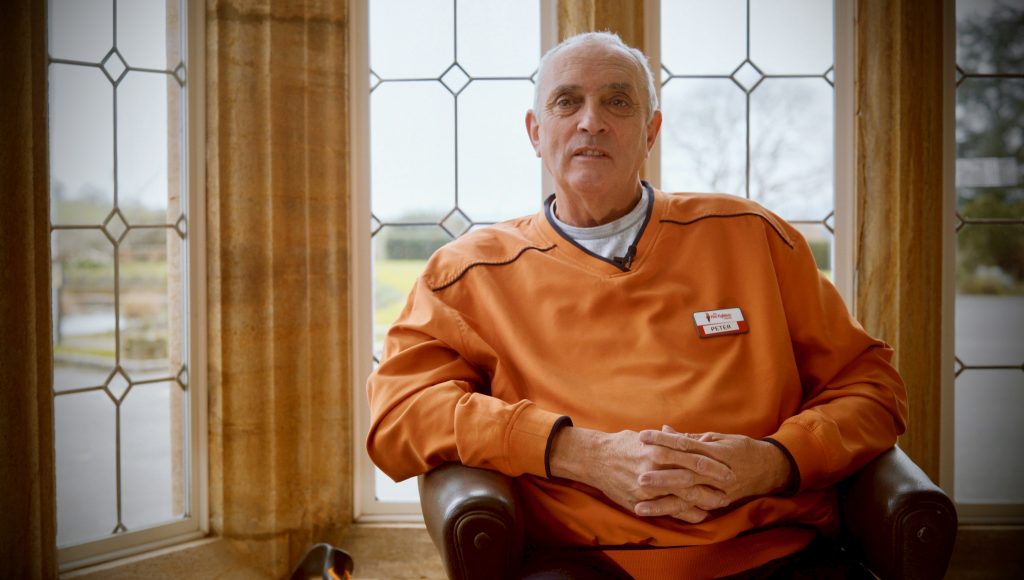When Peter Allen is having a hard day dealing with the pain he lives in, he tells himself things could be very different if it weren’t for a visit he made to Jubilee House, our centre in Cumbria.
“In another 18 months or two years, I would possibly have become quadriplegic,” he says. “I’ve got the staff at Jubilee House to thank for that not being the case. They are the ones who saved me.”
A retired firefighter for Gloucestershire Fire and Rescue Service, Peter found himself experiencing increasing problems with his mobility that were not usual for a healthy man in his early 70s.
“I was stumbling, experiencing headaches, having problems with my legs, pain down my side and all sorts,” he says. “I’d been speaking to GPs and they couldn’t find anything to account for it, so I applied for some rehabilitation at Jubilee House. That’s when they came up trumps.”
After two days at the centre, Physiotherapist Alexis Dykes shared a suspicion that there was more going on with Peter than first met the eye.
“She said she thought I might have a neurological condition, which was news to me,” says Peter. “She contacted my GP and he arranged for me to have an MRI scan. To everyone’s amazement, it showed I had cervical myelopathy.”
A condition that occurs when the spinal cord becomes compressed and squeezed by a lifetime of wear and tear on the spine, the effects of cervical myelopathy can be catastrophic if left undetected.
“The physiotherapist said she thought I might have a neurological condition. She contacted my GP and he arranged for me to have an MRI scan. To everyone’s amazement, it showed I had cervical myelopathy.”
Peter Allen
“It sounds weird to say it was a relief to know something was wrong, but not knowing was so much worse,” says Peter. “A few weeks after this, I had a four-hour decompression surgery where they inserted ceramic disks in the spinal column.”
Because it had gone undiagnosed for so long, the damage was unfortunately irreversible, but having found it when they did, surgeons did manage to prevent any further damage.
“The consultant said if I hadn’t had the surgery, I would have ended up in a wheelchair,” he says. “As it is I have difficulty walking, but things could have been so much worse.”
Peter says he has mixed feelings about his diagnosis; while he was initially angry it had gone undetected for so long, he also says he feels an overwhelming sense of relief that it was discovered when it was.
“My life in the future is not going to be the same, that’s for sure,” he says. “It’s had more of an effect on my mental health than I was expecting. I was always a very positive person, but in the last couple of years I’ve struggled to stay positive. I’ve always been a very fit, sporty person, so I do get depressed about the things I can’t do anymore. I can’t walk my dogs because my mobility is so bad and I’ve lost my core strength. My wife has been wonderful and I don’t know what I’d do without her, but I feel guilty that we can’t do all the things we’d love to spend our retirement doing.”
Keen to try and improve his mobility, Peter applied for further support from the Charity, and when we speak to him, it is during his visit to our Devon recovery centre, Harcombe House.
“The atmosphere here is wonderful, being among serving and retired firefighters and their dependants,” he says. “All the staff are so helpful and understanding, giving out such a positive message. We all hear about the Charity, but I think it’s only really once you come here that you realise how fantastic it is what they do.”
Peter’s hopes for the future are humbling: to be comfortable in retirement and as pain-free as possible. “I just want to try and regain some strength in my body and increase my mobility,” he says. “Life is different to how I thought it would be, but I just have to live with that.”

